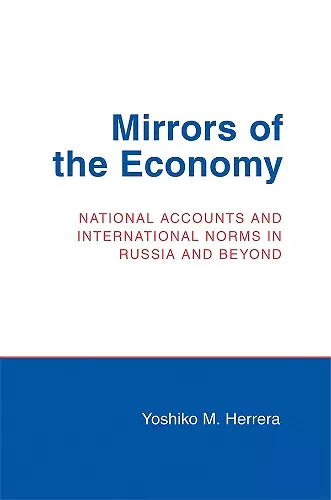Mirrors of the Economy
National Accounts and International Norms in Russia and Beyond
Format:Paperback
Publisher:Cornell University Press
Published:17th Jan '13
Currently unavailable, and unfortunately no date known when it will be back
This paperback is available in another edition too:
- Hardback£108.00(9780801445859)

As international institutions multiply and more governments sign on to standardized ways of organizing economies and societies, resistance to globalization persists. In Mirrors of the Economy, Yoshiko M. Herrera explores the variance in implementation of international institutions through an examination of the international System of National Accounts (SNA) and, in particular, the success of post-Soviet Russia and other formerly communist countries in implementing the SNA. The SNA is the basis for all national economic indicators, including Gross Domestic Product, and is therefore a critical institution for economic policy and development.
Herrera tests existing theories of implementation of international institutions and proposes a novel theoretical concept, "conditional norms," to suggest that the conditions attached to norms may result in institutional change. On the basis of content analysis of statistical publications and more than seventy-five interviews throughout Russia—particularly in Moscow—and in Washington, she forms a clear picture of the implementation of the SNA in Russia in the early 1990s. In Soviet times a stable conditional norm delineated the appropriateness of statistical institutions based on the structure of the economy. The transformation of the economic system triggered a shift in support among Russian and Eastern European statisticians in favor of the SNA. Herrera's argument increases our understanding of the role of norms, structural conditions, and professional communities in institutional implementation.
Studying how Russia has changed the way it does its national economic accounting may sound dry, but it is far from so. On the contrary, given the impact that GDP statistics have on politics and policy choices — sometimes including international politics — how these are measured and reported has immense practical consequences. During the Soviet era, Russia and its neighbors used completely different metrics from those of the United Nations System of National Accounts (SNA), which from the 1950s onward slowly became the international standard. After the collapse of the Soviet Union, Goskomstat—the old Soviet-era statistical agency, staffed with bureaucrats for whom the SNA was anathema—abruptly and thoroughly discarded its old system of accounting. How and why? Herrera believes that the old guard's bifurcated sense of norms (the SNA was for market-based economies; their system, for a command economy) was key. Once one economic order replaced another, so, logically, should one bookkeeping system replace another. This leads Herrera to make a much larger point concerning the way norms influence institutions and institutions influence norms. This she does deftly, adding convincing complexity to standard theory.
-- Robert Legvold * Foreign Affairs *This is an impressive accomplishment of international organization, writ small, and the story of how it took place is more than a contribution to understanding the Russian transition. The book makes a fascinating contribution to the field of international organization.
-- Randall W. Stone * The Russian Revi- Winner of Honorable Mention, 2011 Ed A. Hewett Book Prize (A.
ISBN: 9780801478420
Dimensions: 235mm x 155mm x 16mm
Weight: 454g
272 pages